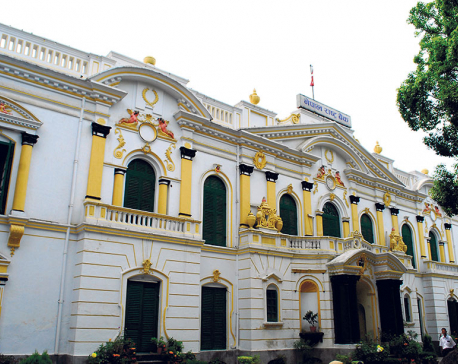
OR
Macroeconomic and Financial Situation Report
External sector position continues to worsen
Published On: April 17, 2019 09:37 AM NPT By: Republica | @RepublicaNepal
BoP slips into deficit of Rs 58.99 billion
KATHMANDU, April 17: Balance of Payments (BoP) deficit widened in the eighth month of the current fiscal year, indicating the worsening external sector position of the country.
According to the Current Macroeconomic and Financial Situation of Nepal (Based on Eight Months’ Data of 2018/19) released by the central bank on Tuesday, the BoP slipped into a deficit of Rs 58.99 billion in the review period compared to Rs 24.73 billion in the same period of the previous fiscal year. In US Dollar terms, the overall BoP recorded a deficit of 518.1 million in the review period compared to a deficit of 241.4 million in the same period last year. Rising import has been blamed for the worsening external sector condition of the country.
The BoP has been on a negative territory continuously since the beginning of Fiscal Year 2018/19. While the pressure on external sector was building from the last fiscal year, the BoP position ended in surplus at the fiscal end last year. However, the BoP started weakening again from the first month of FY2018/19 amid widening trade deficit and slow growth in foreign currency receipt.
The current account registered a deficit of Rs 191.13 billion in the review period. Such deficit was Rs 154.99 billion in the same period of the previous year.
According to data released by the Nepal Rastra Bank (NRB), the total trade deficit widened by 24.5 percent to Rs 887.88 billion in eight months of FY2018/19.
While remittances increased by 23.4 percent to Rs 582.19 billion in the review period compared to a rise of only 4.9 percent last year, the inflow of foreign direct investment and capital transfer dropped in the review period. The data shows that capital transfer and foreign direct investment (FDI) in Nepal amounted to Rs 11.56 billion and Rs 6.66 billion, respectively. In the same period of the previous year, capital transfer and FDI amounted to Rs 11.94 billion and Rs 14.24 billion, respectively.
While the number of workers going abroad for employment has been falling, the remittance inflow has been rising. According to data of the Department of Foreign Employment, number of Nepali workers (institutional and individual) heading to foreign job destinations fell by 38.3 percent in the review period. It had decreased 5.4 percent in the same period of the previous year.
Similarly, foreign exchange reserves of the country continued to plummet in the eighth of the fiscal year as well. Gross foreign exchange reserves stood at Rs 1061.71 billion as at mid-March 2019 from Rs 1,102.59 billion as at mid-July 2018. In US Dollar terms, the gross foreign exchange reserves remained at 9.57 billion as at mid-March 2019 from 10.08 billion as at mid-July 2018.
As the import bill has been rising at a rapid pace, the country has to burn through its reserves to foot the import bill.
You May Like This

Foreign exchange limit for outbound Nepalis lowered to $1,500
KATHMANDU, Nov 7: Nepal Rastra Bank (NRB) has reduced the maximum amount of foreign currency that a Nepali national can buy... Read More...

US dollar at all time high while Nepali currency weakens
KATHMANDU, Sept 27: The value of the US dollar has hit an all-time high in Nepal. ... Read More...

NRB begins process to offload its shares in Nepse Ltd
KATHMANDU, July 17: Nepal Rastra Bank (NRB) is offloading its shares in Nepal Stock Exchange Ltd (Nepse). Issuing a notice... Read More...





Just In
- 286 new industries registered in Nepal in first nine months of current FY, attracting Rs 165 billion investment
- UML's National Convention Representatives Council meeting today
- Gandaki Province CM assigns ministerial portfolios to Hari Bahadur Chuman and Deepak Manange
- 352 climbers obtain permits to ascend Mount Everest this season
- 16 candidates shortlisted for CEO position at Nepal Tourism Board
- WB to take financial management lead for proposed Upper Arun Project
- Power supply to be affected in parts of Kathmandu Valley today as NEA expedites repair works
- Godepani welcomes over 31,000 foreign tourists in a year






_20220508065243.jpg)







Leave A Comment